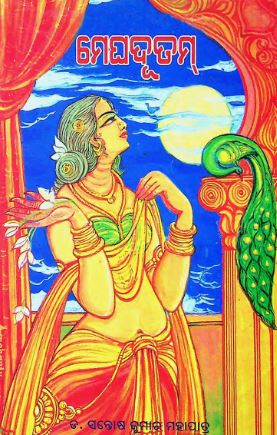Meghadutam or “The Cloud Messenger” is an epic poem penned by the legendary Sanskrit poet Kalidasa. This timeless piece, translated into the Odia language by esteemed translator Kamad Sahu and published in 2001, continues to perpetuate the beauty and classical essence of its origin while making it accessible to Odia readers.
Kalidasa, often celebrated as the Shakespeare of India, is considered one of the greatest Sanskrit poets and playwrights. His works are renowned for their exquisite literary merit, rich imagery, and deep emotional resonance. “Meghadutam” stands out as one of his masterpieces, renowned for its lyrical beauty and poignant narrative.
Kamad Sahu, an acclaimed figure in Odia literary circles, undertook the monumental task of translating this classical work into the Odia language. His translation is noteworthy for maintaining the delicate balance between fidelity to the original text and the linguistic charm of the Odia language. Published in 2001, this translation makes the ancient text accessible to a wider audience while preserving its poetic grandeur and literary depth.
“Meghadutam” is a rich tapestry woven with vivid imagery, metaphors, and a profound sense of longing and separation. The poem is structured as a “kavya,” a classical genre of Sanskrit poetry, and is divided into two parts, Purvamegha (The First Cloud) and Uttaramegha (The Second Cloud).
The poem narrates the sorrowful tale of a Yaksha (a celestial being) who, due to a curse, is banished to live in the desolate forests away from his beloved wife. Consumed by longing and the pain of separation, the Yaksha implores a passing cloud to carry a message to his wife, who resides in Alakapuri, the city of the Gods. The cloud becomes the messenger, or ‘duta,’ embarking on an ethereal journey across the landscapes described with breathtaking beauty and vivid detail by Kalidasa.
The central theme of “Meghadutam” revolves around separation and longing, which is masterfully expressed through the Yaksha’s melancholy and the natural imagery that Kalidasa employs. The yearning for reunion and the hope that love might transcend physical separation resonate deeply, evoking empathy and contemplation in the reader.
Kamad Sahu’s translation of “Meghadutam” into Odia not only opens the gates of classical Sanskrit literature to the Odia-speaking populace but also enhances it with the cultural and linguistic nuances specific to the Odia language. His ability to capture the essence of Kalidasa’s rich metaphors, lyrical cadences, and emotional depth ensures that the Odia version conveys the same beauty and poignancy as the original Sanskrit text.
This translated work stands as a bridge between the rich heritage of classical Sanskrit literature and the contemporary Odia linguistic tradition. It allows readers to experience the universal themes of love, separation, hope, and nature that Kalidasa so eloquently portrays, through the lens of their native language. In doing so, it contributes significantly to the rich tapestry of Indian literature and offers a unique cultural artifact that highlights cross-linguistic and cross-cultural appreciation.
Kalidasa’s “Meghadutam,” through Kamad Sahu’s adept translation, lives on as a cherished jewel in Odia literature. This 2001 publication serves as a testament to the timeless nature of classical poetry and its ability to transcend linguistic boundaries, continuing to touch hearts and minds across generations.
Books Info
| Books name | Meghadutam |
| Author | Kalidas; Santos Kumar Mahapatra |
| No Of pages | 123 |
| Publisher | NA |
| Publication | 2001, 2021, 2e. |
| Printed At | Pragati Printers |
| Distributor | NA |

